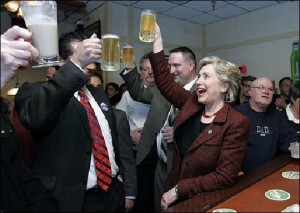One of the more tiresome discussions in American politics concerns the need for candidates to be “authentic.” Voters allegedly rally toward candidates they find “real” and turn against the phonies and the out-of-touch elites. In the words of The West Wing, voters prefer their candidates to be more Neil Young and less Neil Diamond. Or so Michael Gerson argues in his post-mortem of several recent Republican primaries.
Authenticity is more likely a way we rationalize election outcomes afterwards. It helps create a narrative to easily digest a very complicated national election.
Richard Skinner pushes back smartly against this trope in a recent Mischiefs of Faction post, arguing that presidential candidates’ authenticity tends to be rather inauthentic. Washington and Lincoln, Skinner notes, were famously playing roles; they advanced through the ranks in part by portraying certain personas that made them appear to be above politics, even though they were deeply political creatures. And yet we consider these men the archetypes of authentic statesmen today.
The whole concept of authenticity in politics is frustrating, in large part because the concept is essentially meaningless. Every presidential candidate is essentially playing some sort of role. That doesn’t mean that they’re lying; any time we interview for a job, we’re portraying certain qualities in ourselves that we want others to see, and maybe not advertising the fact that we want money, we like beer, we have bad track records with relationships, etc. This is especially acute among politicians simply because Americans are predisposed to distrust politicians. So they go out of their way to convince us that despite spending a lifetime pursuing political office, they’d rather be tilling soil.
Jon Stewart pretty much nailed this in his book Americain this passage describing President George W. Bush:
This Connecticut-born, Yale- and Harvard-educated multi-millionaire son of a former president ran as an outsider in 2000. Many experts still wonder how the fuck he pulled that off.
Really, there are few better indicators of the meaninglessness of the authenticity concept than the 2000 presidential race. The two candidates were both very privileged, white Ivy Leaguers, sons of prominent national politicians, who spoke in thick Southern accents. Yet Bush was considered authentic while Gore was a phony. Why? Because Bush cleared brush on his ranch in jeans?
And it’s kind of sad to see candidates going out of their way to prove their authenticity. This is what led Barack Obama to bowl (poorly) in Pennsylvania and drove Hillary Clinton to drink shots of Crown Royal in Indiana in 2008.
Authenticity is additionally meaningless because we expect candidates to portray some qualities that have little or nothing to do with the responsibilities of holding office. Was brush-clearing a skill Bush needed during his presidency? Does Obama need to bowl much? Whiskey drinking may have briefly helped Hillary Clinton after losing the nomination in 2008, but is it a skill she would require as president?

Luckily, there is little evidence that voters actually care about authenticity. Oh, they may claim it’s important in some surveys, but that doesn’t mean they actually evaluate candidates’ authenticity when they vote. Indeed, authenticity is more likely a way we rationalize election outcomes afterwards. It helps create a narrative to easily digest a very complicated national election. But for a few hundred voters in Florida in 2000, we might be speculating that Bush lost that election because his brush-clearing activities appeared inauthentic or his Texas accent seemed phony.
In fairness, it’s hard to test whether voters actually care about authenticity when they vote. Could we go back and look at past presidential elections and decide in a neutral way who was the more authentic candidate? Well, we could try, but chances are we’ll find that the winner was the authentic one—not because authentic candidates tend to win, but because winners tend to look better in hindsight. More realistically, given what we know about the influence of the economy and other features of the political environment on the vote, there just isn’t much room for authenticity to have much of an impact.
And that, frankly, is a good thing.




